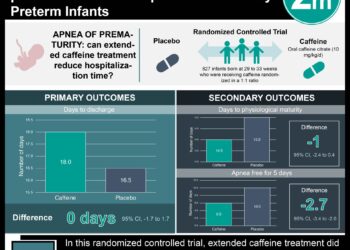Progesterone injections for short cervix do not reduce preterm birth
1. Women randomized to the treatment with progesterone (17-OHP-C) had a similar incidence of preterm birth compared with women in the control group.
2. The treatment and control groups demonstrated no differences in incidence of maternal or neonatal complications.
Evidence Rating Level: 1 (Excellent)
Study Rundown: In the U.S., over 10% of infants are born at less than 37 weeks gestation and are considered preterm. Preterm birth has been associated with complications such as respiratory distress, necrotizing enterocolitis, long-term neurodevelopmental disabilities, and death. Progesterone supplementation with weekly intramuscular progesterone (17-hydroxyprogesterone caproate) injections has been shown to reduce the risk of preterm birth among women with a history of preterm birth but results are mixed with regard to whether women without a history of preterm birth benefit from these injections. In the present work, authors found that for women with a singleton pregnancy, short cervix and an additional risk factor for preterm birth (history of previous spontaneous preterm birth, cervical surgery, uterine anomaly or prenatal exposure to diethylstilbestrol), weekly doses of 17OHP-C from time of enrollment until 36 weeks did not reduce incidence of preterm birth or complications associated with preterm birth. The authors terminated the study ahead of schedule as a result.
Grouping together both women with and without a history of prior preterm birth, an established risk factor for preterm delivery, in the study population introduces the opportunity to bias results toward the null. Additionally, failure to separate out women with this risk factor for preterm delivery precludes comparison of the results of the present study with existing literature on the impact of progesterone injections on recurrent preterm birth (see background reading). Limitations of the study include small sample size and early termination, which may limit the validity of the observed results. Additional large, studies on different at-risk populations are needed to first determine whether progesterone supplementation is effective in preventing preterm birth, and if so, identify appropriate dosing and target populations.
Click to read the study, published in AJOG
Relevant Reading: Progesterone injections reduce recurrent pretem birth [Classics series Prenatal administration of progesterone for preventing preterm birth in women considered to be at risk of preterm birth
In-Depth [randomized controlled trial]: This study evaluated the use of 17OHP-C to prevent preterm birth in women with a singleton pregnancy, short cervix (<25mm) and one of the following: history of previous spontaneous preterm birth, cervical surgery, uterine anomaly or prenatal exposure to diethylstilbestrol. Women were randomized to receive weekly 500mg injections of 17OHP-C intramuscularly (n=51) or control (n=54) from randomization until 36 weeks. Outcomes measured were preterm delivery <37, <34, and <32 weeks; maternal and neonatal complications; and adverse effects.
Women in the intervention group were equally likely to deliver preterm (at <37 weeks gestation) (RR 1.01, CI 0.66-1.55). No statistically significant differences in delivery, maternal or neonatal complications were identified between the two treatment arms. There was no difference in mean time to delivery between the 17OHP-C and control groups (76 and 72 days, respectively, p=0.48).
More from this author: Unexplained infertility often overtreated, Twin-specific gestational diabetes screening guidelines needed, Increased nuchal translucency linked to progesterone therapy, Venous thromboembolism after vaginal delivery rising- preventative measures lacking, Unexpected delivery outcomes associated with postpartum depression
Image: CC/Wiki
©2012-2014 2minutemedicine.com. All rights reserved. No works may be reproduced without expressed written consent from 2minutemedicine.com. Disclaimer: We present factual information directly from peer reviewed medical journals. No post should be construed as medical advice and is not intended as such by the authors, editors, staff or by 2minutemedicine.com. PLEASE SEE A HEALTHCARE PROVIDER IN YOUR AREA IF YOU SEEK MEDICAL ADVICE OF ANY SORT.






